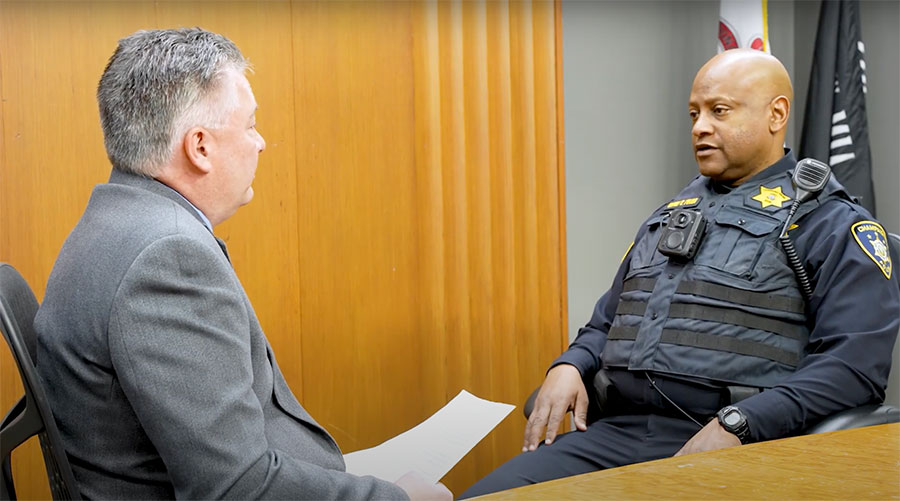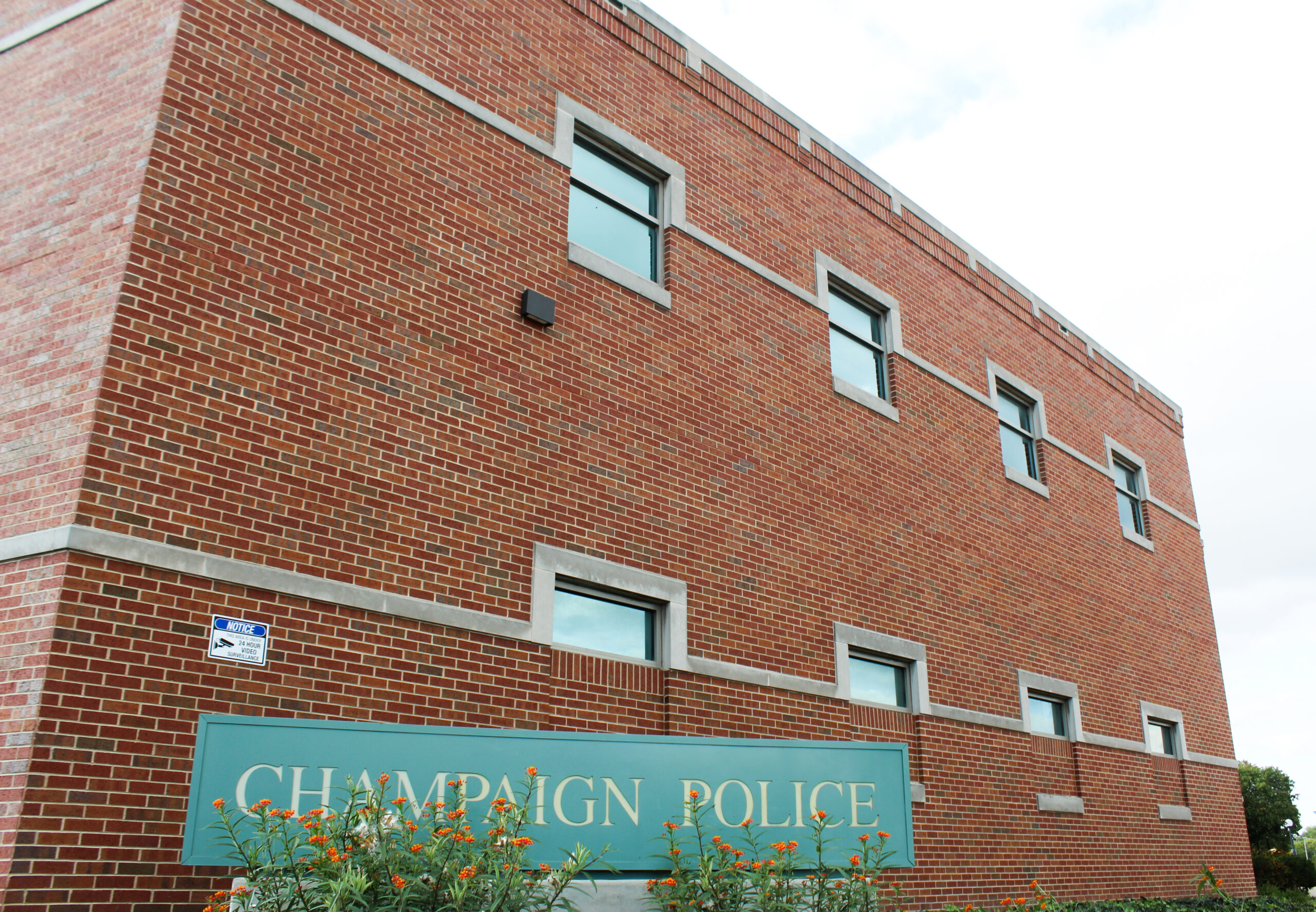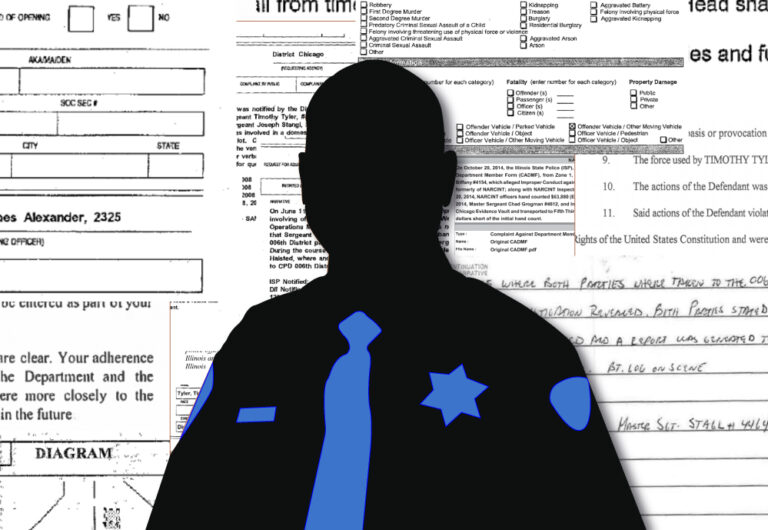This story is part of a partnership focusing on police misconduct in Champaign County between the Champaign-Urbana Civic Police Data Project of the Invisible Institute, a Chicago-based nonprofit public accountability journalism organization, and IPM Newsroom, which provides news about Illinois & in-depth reporting on Agriculture, Education, the Environment, Health, and Politics, powered by Illinois Public Media. This investigation was supported with funding from the Data-Driven Reporting Project, which is funded by the Google News Initiative in partnership with Northwestern University | Medill.
When Timothy Tyler applied for the Champaign Police Chief position in 2022, the Champaign City Council was given his “resumes and cover letters and recommendations — things of that nature,” according to Council member Davion Williams.
New documents obtained through open records requests by Invisible Institute and IPM Newsroom suggest the council was not privy to a more detailed accounting of Tyler’s policing history, which is marked by a trail of disciplinary actions and other incidents ranging from suspensions for “unfavorable” conduct while serving with the Illinois State Police to entanglements in several federal civil rights lawsuits.
After receiving information and questions about Tyler’s background and disciplinary history from Invisible Institute and IPM Newsroom, City Council member Davion Williams forwarded the email to City Manager Dorothy Ann David and asked, “Were we aware of these incidents as a city?”
Several of the investigations into Tyler’s misconduct led to settlements and disciplinary action. Among those: an off-duty domestic incident with an ex-girlfriend, an improper vehicle pursuit that ended in a crash outside of Chicago Police headquarters, and missing currency from a narcotics bust. In addition, federal civil rights lawsuits accused him of false arrest and conspiring with city officials to illegally shut down a nightclub in his previous position in Markham.
According to the Champaign city manager’s office, Tyler disclosed his “disciplinary history as part of his application materials for the job.”
However, the details of what Tyler specifically disclosed in his application remain unclear because the city refuses to release neither the background investigation it commissioned nor the questionnaire filled out by Tyler. The city claims those records contain proprietary confidential materials of Baker Tilly, the international accounting firm the city hired to search for its new police chief.
In response to the allegations compiled by Invisible Institute and IPM Newsroom, which were verified by documents obtained from the Illinois State Police, Champaign City Manager Dorothy Ann David sent an emailed statement saying Tyler’s professional references complement his leadership and performance, “particularly noting his professionalism, integrity and commitment to public service.”
“The incidents of discipline from earlier in the Chief’s career were handled by his employers according to their policies,” she continued, “and did not hinder the Chief from being promoted through the ranks in those agencies.”
The city manager refused to answer any additional questions about the incidents. “No additional information will be provided,” the Champaign Police Department’s public information officer responded in an email.
The department would not make Tyler available for comment.
This lack of transparency is seemingly at odds with how Tyler himself has described his early workings with the city. “The city of Champaign puts their money where their mouth is,” Tyler said in a promotional interview released by the city in February 2023. “I’ve never really seen a city government where they’re very upfront and transparent about the relationship with the police department.”

But if the city is so transparent, why haven’t officials disclosed more about Chief Tyler’s background to council members and the public? That’s a question raised by local activist Rita Conerly.
“It’s disturbing to know that we have someone who has had disciplinary actions against them and they are now in this position of the highest leadership within our police force,” Conerly said.
Illinois State Police: Suspensions and settlements
In June 2008, at around 1:30 a.m., Tyler drove to the Chicago Police Department’s 6th District, on the city’s South Side. There, he got into an argument with his ex-girlfriend, a CPD officer, according to an investigation released under the state Freedom of Information Act. After she got into his personal vehicle, Tyler locked the car doors and drove to an alley behind a grocery store, where they continued to argue loudly.
Eyewitnesses later told investigators for the Illinois State Police’s Division of Internal Investigation (DII) that both Tyler, who was a sergeant in the ISP’s Des Plaines office at the time, and his ex-girlfriend had taken their guns out of their holsters, and that the ex-girlfriend had briefly pointed her weapon at Tyler.
According to an eyewitness, Tyler also pulled his ex-girlfriend by her utility belt and grabbed her arm. “You f***ed up, you put your hands on me, don’t make me shoot you,” she responded, the eyewitness told DII investigators. (Invisible Institute does not name victims of domestic violence without consent; the woman, who is still a CPD officer, did not respond to requests for comment.)
Several CPD officers interviewed by DII investigators said Tyler seemed slightly intoxicated or smelled of alcohol; he told responding CPD officers that he only had one or two beers that night. His ex-girlfriend, who gave conflicting accounts of their relationship to the eyewitnesses, DII investigators, and fellow CPD officers, told DII that she had met Tyler while part of an internship program at ISP.
Tyler was not arrested or charged for the incident, but the DII investigators sustained charges against him for not immediately notifying superiors of his contact with police, conducting himself “unfavorably,” and improperly drinking while off-duty. Before he could be interviewed for the internal investigation, Tyler notified DII that he wanted to sign a settlement agreement, bringing the investigation to a close.
Disciplinary settlement agreements with the Illinois State Police are “intended to benefit the accused officer by allowing the officer to avoid an investigation and discipline process by admitting to wrongdoing and accepting discipline,” ISP policies state.
Tyler was eventually suspended for seven days, DII records show.
Later that year, in November 2008, Tyler improperly chased a car that fled a traffic stop, an ISP internal board found. A trooper had pulled over a Pontiac sedan near the Dan Ryan Expressway in Chicago’s Washington Park neighborhood for seat belt and turn signal violations.
Tyler, at the time still a sergeant, pulled up to the scene as the trooper was searching for information on the driver and passenger, having learned that they were both wanted on warrants (the records don’t reveal what the warrants were for). After the trooper asked the driver to step out of the vehicle, she quickly peeled out onto the expressway.
Tyler pursued the car but lost sight of it shortly after it exited the highway near the Chicago Police Department headquarters in the Bronzeville neighborhood. The car later ran a red light and collided with another vehicle. In his report, Tyler speculated that the driver had become “nervous” after a “swarm” of CPD squad cars filled the area, which had responded to his alert of the fleeing driver. The driver and passenger of the other car involved in the collision were taken to Stroger Hospital. According to police records, there were no injuries.
An ISP Pursuit Policy Board reviewed the trooper’s dashcam (Tyler’s was not functioning, he wrote in a report) and found that Tyler had improperly initiated a pursuit by following the Pontiac at a high speed with his lights on. As with the previous investigation, Tyler and ISP entered into a disciplinary settlement agreement, this time resulting only in a written reprimand.
Disciplinary charges were also sustained against Tyler after he was promoted to lieutenant. A 2014 DII investigation found that he and three other members of an interagency narcotics team were at fault after a $100 bill seized during a traffic stop went missing. Tyler entered into a third settlement agreement with ISP and again received a written reprimand.
After the 2014 traffic stop, but before the investigation was completed, Tyler moved to the St. Louis Metro East region, and was shortly thereafter promoted to commander and placed in charge of 120 troopers and civilian employees in ISP’s Districts 11 and 18. He eventually was elevated to deputy director of ISP and oversaw its training academy until November 2020, when he was tapped to lead the Illinois Department of Natural Resources’ Office of Law Enforcement, a role in which he served while on interagency loan from ISP. During this time, he didn’t receive any additional complaints, according to ISP and IDNR.
Markham: Federal lawsuits and corruption allegations
Before joining ISP as a cadet in 1998, Tyler was an officer, and later sergeant, for five years with the police department in Markham, a south suburb of Chicago that had around 12,000 residents at the time. There, he faced accusations of taking part in the city government’s well-known corruption, including soliciting a bribe from a nightclub owner, Leonard Garrett, who later filed a federal lawsuit accusing Tyler and other city officials of retaliation and intimidation.
In 2002 Garrett, who owned Club Mycasa, filed a complaint in court. In court filings, he accused Tyler, a sergeant at the time, of soliciting him “for cash to secure police protection.” After refusing and complaining to the mayor, police chief, and chair of the police commission, Garrett writes that the city government began retaliating against him. Among the allegations: city officials removed a permanent sign outside of his business, conducted a “raid” at his club, blamed him for nearby violence, refused to provide police services to his club, and eventually rescinded his liquor license.
Then-Alderman David Webb, whom Garrett accused of “trespassing” at the club with six Markham police officers to intimidate him, later served as mayor for 16 years before pleading guilty to accepting over $300,000 in bribes. He was released in 2023 after serving a two-year federal prison sentence.
Garrett’s case was later dismissed on a technicality after he failed to comply with a court order requiring specific amendments and clarifications to his fillings.
During his tenure in Markham, Tyler was the subject of two other federal civil rights lawsuits. One lawsuit, filed by Jama Hason, accused him of excessive force and false arrest; that case was settled out of court for an undisclosed amount.
In the other lawsuit, filed by Michael Corbett, Tyler was accused of pressuring Corbett into apologizing to another Markham officer that Corbett had said arrested him without reason. After a trial, a federal jury ruled in favor of Tyler and his co-defendants. Invisible Institute and IPM Newsroom were unable to reach any of the plaintiffs, and Markham’s city government said it did not have any records about Tyler’s time with the department.
Unanswered questions and document denials
A few months after taking office in 2022, Tyler spoke with local media about his prior work experience.
“I’m coachable and moldable — you can make me a great chief, you can make me a bad chief, I’m still being developed, but I have a good blueprint and a history on how to lead organizations,” Tyler told the News-Gazette.
As part of its reporting into his “blueprint and history,” Invisible Institute has appealed the city of Champaign’s denial of Chief Tyler’s background investigation and hiring materials to the state Attorney General’s Public Access Counselor, which is still considering the appeal.

In a letter to the PAC, the city claimed that the entirety of Tyler’s background investigation is “highly personal information” that he did not consent to the disclosure of, and that the release of the questionnaire that he filled out — and the questions themselves — “would cause competitive harm” to the accounting firm Baker Tilly.
“The invasion into Chief Tyler’s entire life simply because he chose to serve the public is not justified,” then-Assistant City Attorney Nancy Rabel wrote. (She is now the city’s assistant director of human resources.)
Since taking office, Tyler has prioritized responding to an increase in shootings that occurred in 2021 (the number was falling by the time he was appointed). The department has invested in new surveillance technology, some of which was initially purchased before Tyler’s tenure, and a slick $159,000 recruitment campaign to counter what the city calls a police “staffing crisis.” The department has also begun working more closely with the University of Illinois Police Department and private contractors to patrol the Campustown and downtown areas.
While the Champaign City Council is invited to provide informal input on who is hired for city jobs, the ultimate decision lies solely with the city manager, according to the city’s municipal code. In Urbana, by comparison, it’s up to the mayor, but subject to “advice and consent of the city council,” according to its municipal code.
The lack of formal public or City Council input concentrates the decision-making power in one person’s hands: City Manager Dorothy Ann David, who has served in that role since 2013. There was no official hiring committee for the position, Council member Davion Williams said in an interview, and David held just one public meeting for residents to meet the finalists that she and Baker Tilly had selected.
Former Champaign City Council member Clarissa Nickerson Fourman said the council she was part of was constantly questioning the city’s decisions and engaging with the community by answering residents’ calls and emails. Now, she says the current council is going through the motions and refusing to answer the community’s questions.
“You can see a huge difference in how we approach[ed] the community and transparency, and how they do now,” Nickerson Fourman said.
Former Champaign Mayor Don Gerard oversaw the hiring of the Champaign Police Department’s last chief, Anthony Cobb. Gerard said he and then City Manager Steve Carter worked to make the hiring process transparent.
“It’s good to have lots of input, and [we] did work with the community and the council as a whole, to make the process very transparent [and] open,” said Gerard, who ran against current Mayor Deb Feinen in the 2023 municipal elections. Feinen did not respond to repeated requests for comment.
As a survivor of domestic violence, Conerly, the activist, said she’s disappointed by Tyler’s background, which includes an allegation of domestic violence.
It’s even more disappointing, she said, that Tyler did not request any further training or changes to the department’s response to domestic violence calls after joining the department. As Invisible Institute and IPM Newsroom reported in October, Conerly filed a complaint against the Champaign Police Department in 2020 after an officer did not make a report during a domestic incident, something that previous police chief Anthony Cobb had identified as an issue of wider “agency culture.”
“It weighs heavy, because we know, especially with domestic violence, that police don’t respond to victims in a way in which the victims need,” Conerly said. “And so to have someone at the top, who has conducted similar activity, it’s almost like a slap in the face.”
Additional reporting by Isra Rahman, Invisible Institute
Farrah Anderson is an investigative reporting fellow with the Invisible Institute and Illinois Public Media and a journalism student at the University of Illinois. Follow her on Twitter @farrahsoa.
Sam Stecklow is a journalist and editor with the Invisible Institute. He works on its Champaign-Urbana Civic Police Data Project and investigations. Follow him on Twitter at @samstecklow.
9(MDM5MjE5NTg1MDE1Mjk1MTM5NjlkMzI1ZQ000))

